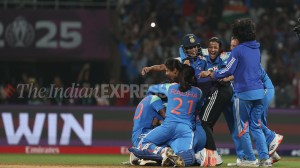They all share a common bond
They still come, wide-eyed and curious and the ask questions of children playing in the grounds of what is a school here in the south. It wi...

They still come, wide-eyed and curious and the ask questions of children playing in the grounds of what is a school here in the south.
It will, of course, be used again for what it was built for, but that could be still a couple of weeks away when the teachers and pupils return.
At present, it is used as a welfare centre and where 12-year-old Dimagee Jayantha and her brother, 10-year-old Ben, are busy carrying water to their mother, Ganeesha, now seven months pregnant and one of eight expectant mothers at this makeshift refugee camp.
Ganeesha now has a common bond with the seven other pregnant women in the camp; two of them widows and expecting their first babies.
The bond is the uncertainty of the future. It is not a matter if rebuilding a life out of the rubble, debris and wreckage of the tsunami, but what is going to happen to child yet to be born, and them as a family unit.
They have managed to get several mattresses and take in turns to sleep, to collect mood and make meals for those children who survived Boxing Day 2004, or 9.0/2004 as one Sri Lanka TV station depicts the event and the seismic waves that destroyed the life they knew.
Dimagee knows she was lucky as she was swept into the river with her brother and survived because she was pulled out of the swirling raging torrent before it tore back into the sea.
She still has nightmares and cries in her sleep, her brother, Ben, too at times. A three-year-old Shezna clings to her pregnant mother Rifla and screams when they see the remains of the house they once lived in near the sea to look for some clothing.
Even when going to a tap to wash the child, the sight and smell of the sea sets her off and other young children traumatised by the events. Only after they try to sleep at night do the pregnant women and widows have time to mourn lost family members: husbands or parents, or as in some cases all three.
They have no idea if their husbands are buried in one of the mass graves or were swept out to sea, maybe never to return. Most weep silently into a shawl or crumpled dress.
Ganeesha says sleep is hard to come by as the children, Dimagee and Ben among them, scream in their sleep, shivering as they wake to find they are alive and their mother is there to comfort them.
There is no one to comfort Ganeesha as she cuddles her swelled stomach. All around, the stench has become unbearable. Galle, a place once visited by Marco Polo on his Asian travels, inhabited by Portuguese, Dutch and then the British, has become a city of silence, surgical masks and curious tourists.
Along the southern coast, there is despondency among most adults in camps for the displaced as relief aid is taking its time to reach them, and among the rubble and rotting garbage, children look wild-eyed and scared.
Sri Lanka’s tsunami generation is learning the harsh reality of survival while most politicians live comfortably in far off Colombo.



- 01
- 02
- 03
- 04
- 05



























